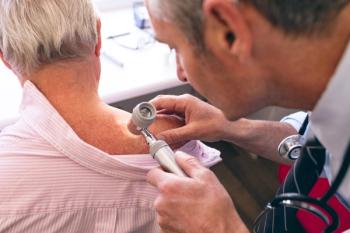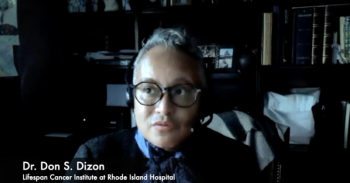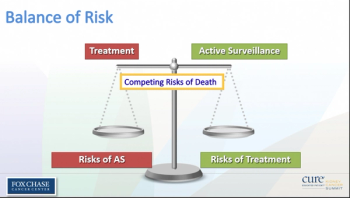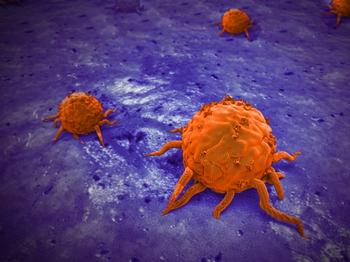
Here’s a look back at CURE®’s top-performing melanoma content from the year 2021.

Brielle Benyon, Assistant Managing Editor for CURE®, has been with MJH Life Sciences since 2016. She has served as an editor on both CURE and its sister publication, Oncology Nursing News. Brielle is a graduate from The College of New Jersey. Outside of work, she enjoys spending time with family and friends, CrossFit and wishing she had the grace and confidence of her toddler-aged daughter.
Follow Brielle on Twitter @Brielle_Benyon.

Here’s a look back at CURE®’s top-performing melanoma content from the year 2021.

The Food and Drug Administration approved Orencia, which is commonly used to treat conditions like rheumatoid arthritis, to prevent acute graft-versus-host-disease in adults and children who underwent a hematopoietic stem cell transplant from an unrelated donor.

The addition of a drug commonly used to treat arthritis may reduce the risk of graft-versus-host-disease in patients who underwent haploidentical allogeneic stem cell transplant.

Dr. Don S. Dizon discusses how cancer centers can be more inclusive to the LGBTQ+ community, from the naming of the institutions to the types of magazines found in the waiting rooms.

The use of a novel drug combination yielded positive outcomes in patients with B-cell lymphomas for whom CAR-T cell therapy or stem cell transplant isn’t an option.

Study results showed that pathologic complete response rates were not significantly different between Black and White patients with high-risk breast cancer, but disparities still exist for other treatment outcomes.

Researchers found that depression and anxiety may skew patient perceptions of participating in blood cancer clinical trials, thus contributing to low enrollment throughout the United States.

Patients with large B-cell lymphoma tended to have better quality of life that continued to improve over time after receiving Breyzani compared to those given standard of care.

A three-drug regimen was shown to lengthen the amount of time before cancer progressed to the central nervous system — known as central nervous system progression-free survival — in certain patients with breast cancer.

Clinical trial results show that adding Keytruda to chemotherapy prior to surgery for triple-negative breast cancer can improve outcomes and hopefully “increase the chances for patients to be cured,” according to an expert.

Treatment modifications in the pre-surgery setting led to a lower rate of pathologic complete response in Black patients with breast cancer, the researchers found.

Amma was developed by a cancer survivor who wanted an easier — and cheaper — way for patients to preserve their hair during chemotherapy treatment.

The FDA approved adjuvant Keytruda for patients ages 12 and older with stage 2b, 2c or 3 melanoma that has been completely resected.

LeVar Burton, most noted for his roles in “Reading Rainbow” and “Star Trek”, stresses how important storytelling is — both in everyday life and in health care settings.

With recently revised treatment guidelines, doctors may be more likely to recommend active surveillance to men with low-risk prostate cancer.

Certain post-menopausal women with HR-positive, HER2-negative breast cancer may be able to only undergo endocrine therapy after surgery – sparing themselves from the chemotherapy side effects.

The FDA approved the three-drug regimen of Darzalex Faspro, Kyprolis and dexamethasone for patients with pretreated relapsed/refractory multiple myeloma.

Mirvetuximab soravtansine had promising response rates and tolerability in patients with pretreated folate receptor alpha-high platinum-resistant ovarian cancer.

Certain over-the-counter supplements can make chemotherapy less effective or even be the reason a breast cancer surgery is delayed.

Upfront immunotherapy was far superior to upfront BRAF/MEK inhibition in patients with metastatic BRAFV600-mutant melanoma, causing the phase 3 DREAMseq early to stop early.

Virgil Abloh, founder of Off-White and Louis Vuitton’s first Black creative director, died of cardiac angiosarcoma this Sunday.

Immunotherapy side effects are a different than those of chemotherapy and other cancer treatments. Patients should know when to seek emergency care and what to communicate to clinicians.

Some patients with kidney cancer do not need to rush into the operating room, explained Dr. Alexander Kutikov.

With three BTK inhibitors approved for treatment of mantle cell lymphoma, patients and providers should consider side effects and insurance coverage before deciding on a drug.

An expert explains how two common myeloma treatments – CAR-T cell therapy and bi-specific antibodies – work, and which patients may want to steer clear from these treatment modalities.

Imbruvica plus Breyanzi, a CAR-T cell therapy, improved outcomes in patients with relapsed/refractory chronic lymphocytic leukemia, according to recent research.

A breast surgeon discusses what patients and their caregivers should know before breast cancer surgery.

Without a huge difference in efficacy between many of the available treatments for Waldenstrom’s macroglobulinemia, one expert says patients and their clinicians should look to other factors when deciding which regimen is best.

When LGBTQ+ patients speak up about discriminatory experiences in cancer care, it can help take back the power and pave the way for better care in the future.

Patients should understand the different prognostic scoring systems used in myelofibrosis, and how the results can impact treatment decisions.